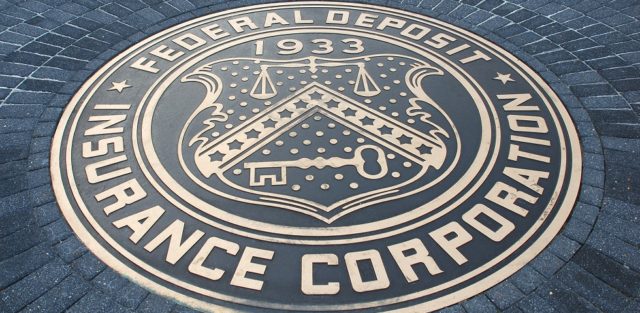FDIC data breaches indicate systemic failures in security management and monitoring

Initial reports last month of a data breach at the Federal Deposit Insurance Corporation (FDIC), the quasi-federal government agency that oversees the soundness of the nation’s banks and insures millions of Americans’ deposits held by those banks, triggered an embarrassing and troubling series of disclosures about what seems to be a pattern of data exfiltration by FDIC employees who are leaving the agency. The February 2016 incident, which apparently included personal data on 44,000 individuals, was attributed by an FDIC executive to an inadvertent action by an employee who copied the data to a personal storage device on the employee’s last day with the agency. It turns out that the February incident was far from an isolated event; after being asked by the Chairman of the House Science, Space and Technology Committee to provide information about all major breaches at FDIC, the agency disclosed a similar incident that occurred in October 2015 and five other incidents since October, all of which involved outgoing employees copying FDIC data on customers to personal devices. Following a Congressional Subcommittee hearing on May 12, during which FDIC executives tried to explain why they had not previously notified Congress of seven breaches over a five-month period that potentially affected 160,000 individuals, members of Congress were so unimpressed with the agency’s response that they suggested FDIC may have lied to or misled the Committee at the hearing and requested revised testimony about the breaches and FDIC’s response to the incidents. Committee members seemed especially skeptical of FDIC’s claims that the employees who took the data acted inadvertently and without malicious intent, particularly in the case of an employee with a background in IT management who copied large amounts of customer records to a portable hard drive before leaving government employment to work in the private sector.
Media reports (and even some of the statements by members of Congress at hearings convened for the purpose of making FDIC executives explain the agency’s actions) focused to a large extent on the FDIC’s decision not to promptly (within seven days) report the incidents to Congress, as required under the Federal Information Security Modernization Act of 2014 (FISMA) and as directed by the Office of Management and Budget (OMB) in its Memorandum M-16-03, issued in October 2015 right around the time that one of the breaches occurred. It’s worth noting that under long-standing federal regulations and OMB guidance FDIC was already obligated to immediately (within one hour of discovery) report the PII breach to the Department of Homeland Security. It should also be pointed out that, despite the relative newness of the OMB guidance, the requirement to report major incidents to Congress within seven days is in the text of the FISMA law (codified at 44 USC §3554) so there is no reason to think that security officials didn’t know that the requirement existed. In testimony to Congress on May 12, FDIC CIO Lawrence Gross noted that FDIC does report all incidents (presumably including the ones that were not reported to Congress) to US-CERT, but Congressional committee members were upset that they were not notified. What should be even more troubling than the poor incident response (including reporting) is the apparently complete inability of the agency to prevent large-scale data exfiltration. The public description of several of the breach events by FDIC officials illustrates very well the difference between detection and prevention. Even though multiple FDIC statements and memos refer to DLP technology (typically taken to mean “data loss prevention” in the industry, although it could be construed to mean protection). Indeed, the FDIC cites its DLP as the mechanism that alerted it to the actions of its employees (copying PII to thumb drives or other removable media). Unfortunately, alerting seems to be all the DLP system did, as the employees were not prevented from copying data to removable media and, in the case of the February breach that received so much attention, FDIC was alerted to the act of copying sensitive data three days after it occurred; in an October incident, the lag was eight days.
The excuse posed by FDIC for not reporting the PII breaches to Congress hinges on the definition of “major,” which, to be fair, was not included in FISMA and was not formally published by OMB until M-16-03. In that Memorandum, OMB laid out a framework rather than an explicit definition, maintaining a level of subjectivity that should have been expected to result in differences of opinion about whether a specific incident is or is not a major incident. The framework includes four factors: information classification; recoverability; mission impact; and exfiltration, modification, deletion, unauthorized access, or lack of availability of 10,000 or more records or affected individuals. OMB’s framework strongly implies that the first three factors must all be present in combination, but not the fourth factor. Each of the breaches experienced by the FDIC involved personally identifiable information (considered a type of controlled unclassified information) of more than 10,000 individuals that was recoverable in a time period greater than eight hours. The only factor not in evidence was impact to a critical service at FDIC. It’s somewhat difficult to understand how anyone at FDIC could arrive at the conclusion that the incidents were not major – the FDIC’s Office of Inspector General reached the opposite (and correct) conclusion. Stranger still is the justification Gross gave for not categorizing these incidents as major: decisions that the data exfiltration events were inadvertent, non-adversarial, and did not lead to subsequent dissemination to unauthorized parties. These are certainly mitigating factors in determining the risk of harm to individuals affected by the breaches (who were not notified), but they are irrelevant for the purposes of federal incident reporting requirements.
 SecurityArchitecture.com
SecurityArchitecture.com
